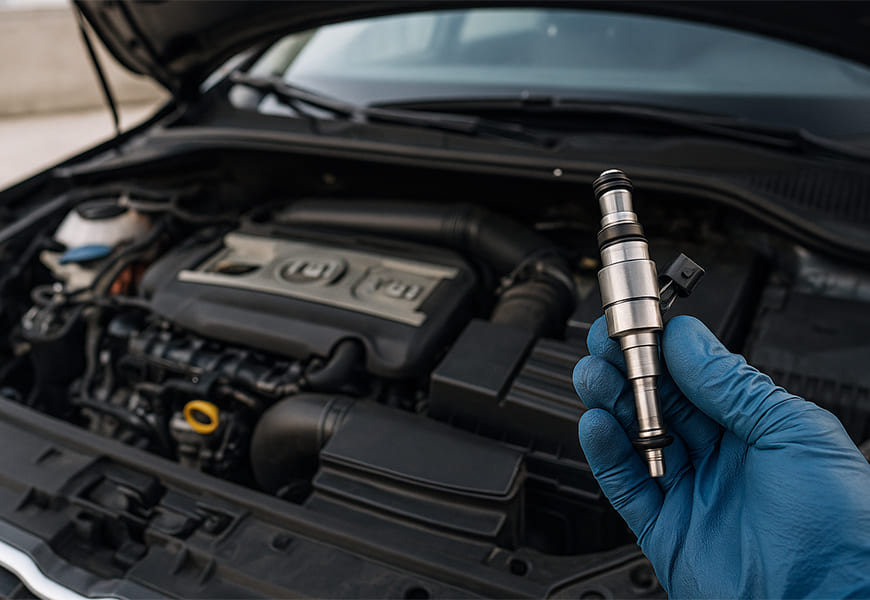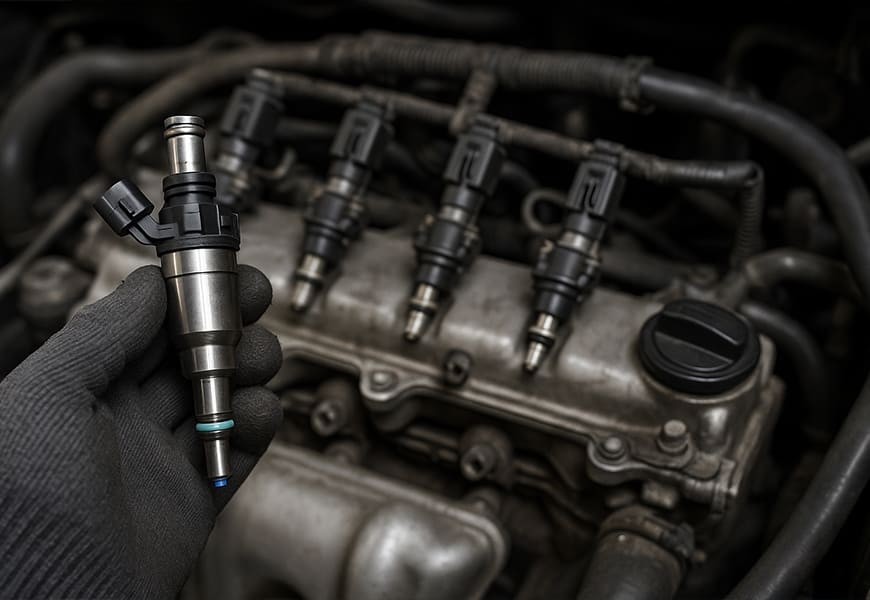What are FSI, TSI, TFSI, GDI Injectors and How Their Maintenance Affects Fuel Consumption and Engine Performance

FSI, TSI, TFSI, and GDI injectors are key components of modern gasoline engines that use direct fuel injection technologies. These systems allow for the optimization of the fuel delivery process directly into the combustion chamber, ensuring much better engine performance. However, to ensure these systems work properly, regular maintenance is required.
What are FSI, TSI, TFSI, and GDI Injectors?
FSI (Fuel Stratified Injection), TSI (Turbocharged Stratified Injection), TFSI (Turbo Fuel Stratified Injection), and GDI (Gasoline Direct Injection) are types of direct fuel injection systems used in gasoline engines. Each of these systems has its own characteristics, but the essence of their operation is the same: fuel is injected directly into the combustion chamber, allowing for more efficient fuel use, reducing refueling costs, and increasing engine power.
- FSI (Fuel Stratified Injection) — a system developed by Volkswagen that increases engine power while reducing fuel consumption by 15%. This is achieved through optimal mixing of fuel and air.
- TSI (Turbocharged Stratified Injection) — a modified FSI with turbocharging. Using a turbocharger, it achieves increased power without significantly increasing fuel consumption. This system allows for more power from a smaller engine volume.
- TFSI (Turbo Fuel Stratified Injection) — an improved version of TSI that combines innovative direct injection technology with turbocharging. This system provides high efficiency and fuel economy, while also reducing harmful emissions.
- GDI (Gasoline Direct Injection) — a direct fuel injection technology used by many major car manufacturers, such as Toyota, Hyundai, Mitsubishi. It significantly improves fuel efficiency and enhances power while reducing fuel consumption.

How does injector maintenance affect fuel consumption and engine performance?
Proper maintenance of FSI, TSI, TFSI, and GDI injectors is critical to maintaining high engine performance. Injectors that are not regularly cleaned and diagnosed can cause several problems:
- Poor fuel atomization — when injectors are clogged, the fuel does not atomize evenly, leading to poor combustion and increased fuel consumption.
- Increased fuel consumption — clogged injectors cannot deliver the proper amount of fuel to the combustion chamber, leading to higher fuel consumption and reduced engine power.
- Engine performance issues — improper fuel delivery affects engine operation. This can manifest as misfires, knocking, power loss, or difficulty starting the engine.
- Increased harmful emissions — if injectors are not functioning properly, it can lead to increased emissions of harmful substances into the atmosphere, negatively impacting the environment.
Therefore, regular maintenance of injectors helps keep the injection system working optimally, reduces fuel consumption, and maintains engine performance.
When should FSI, TSI, TFSI, GDI injectors be cleaned?
Injector maintenance is typically recommended every 30,000 to 40,000 km. However, there are a few clear signs that injectors need immediate attention:
- Increased fuel consumption — if your car is consuming more fuel than before, it may be a sign of clogged injectors.
- Gasoline smell inside the cabin — if you notice a gasoline smell inside the cabin, it could indicate improper injector performance.
- Engine misfires — if the engine runs rough, doesn’t pull, or knocks, it may be related to injector issues.
- Power loss — a sudden drop in power or difficulty starting the engine could indicate a need for injector maintenance.
- Excessive smoke emissions — if your vehicle is emitting more smoke or “popping” while running, it may be a sign that the injectors are not functioning properly.
Injector Maintenance Costs: Service Prices
The cost of injector service depends on several factors, such as the make and model of the vehicle, year of manufacture, difficulty of injector removal, and type of service. Here are approximate service prices:
- Computer diagnostics of injectors — from 400 UAH
- Injector removal — from 450 UAH (without removing the manifold), from 2400 UAH (with manifold removal)
- Injector bench diagnostics — from 400 UAH (for removed injectors)
- Ultrasonic cleaning of injectors — from 400 UAH (in an ultrasonic bath)
- Ultrasonic cleaning and injector service — from 500 UAH (with seal replacement)
Prices may vary depending on the vehicle model, year of manufacture, and removal complexity. For exact pricing, we recommend contacting our consultants at Autopark-Service.
Conclusion
Cleaning and servicing FSI, TSI, TFSI, GDI injectors are essential for maintaining your vehicle’s efficiency, reducing fuel consumption, and preventing serious breakdowns. Regular maintenance, including ultrasonic cleaning, helps maintain high engine efficiency and productivity, while also reducing harmful emissions.
So, if you want to keep your vehicle in good condition, save on fuel costs, and extend the lifespan of your engine, timely diagnostics and injector cleaning are an essential part of your vehicle’s maintenance.
